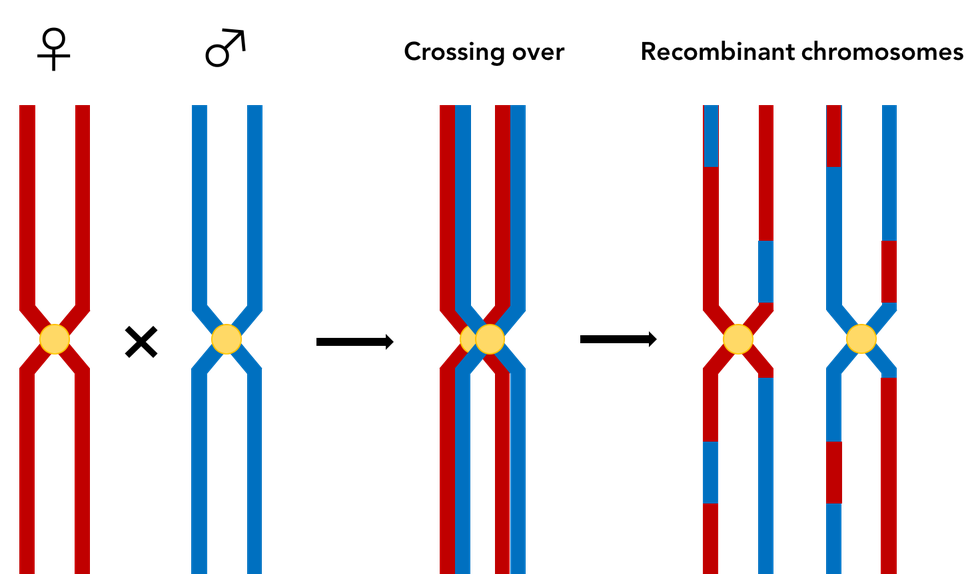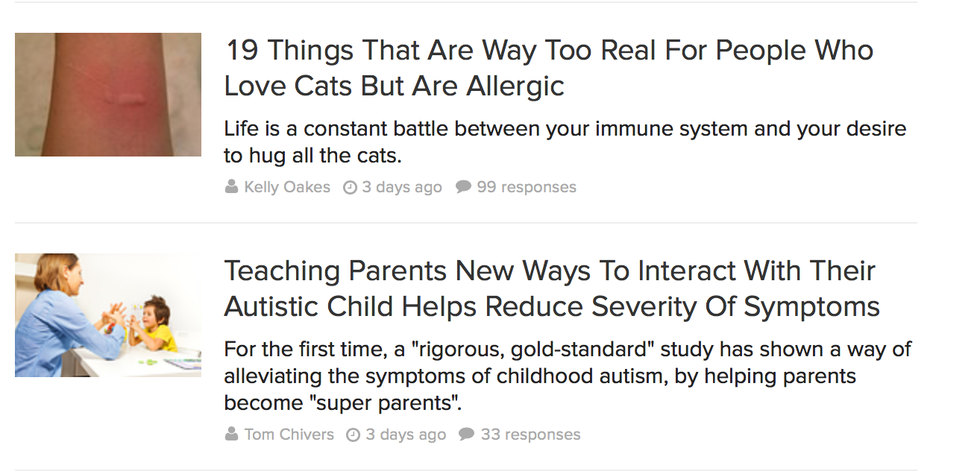Many of you have probably seen some variation of the headline “Scientists say intelligence is inherited from mothers” in your newsfeeds recently. On behalf of actual scientists everywhere, I apologize. A cursory Google search points to one of the top hits being an article from The Independent, which includes a 30-second montage of alternating famous TV moms and blundering male idiots. In between Lorelai Gilmore, Lucille Bluth, Cersei Lannister, and other prime examples of motherhood, there are flashes of text claiming “Intelligence genes are carried on the X chromosome” and “Women have two… Men have only one.” That’s right, boys - that means you’re one plus one equals twice as stupid. If you go on to read the rest of the article, you’ll find the single actual reference points to a blog called Psychology Spot. While it is commendable that they bothered citing anything at all, I don’t think I have to restate the absurdity of relying on a blog post to shore up a scientific claim.
A laughably incorrect representation of DNA and chromosomes. © nobeastsofierce/shutterstock.com
Without going into too much detail on all the different ways the article fails to make any logical sense, I’ll highlight the points which I found most offensive. First of all, the article seems to be laboring under the impression that there are such things called “intelligence genes,” which are supposedly found on the X-chromosome. Intelligence isn’t some discrete quality that is governed by a specific set of genes in a single chromosome. It is insanely complicated and abstract, and probably dependent on a huge number of factors like genetics, environment, upbringing, diet, education, etc. And genetics is complicated too. No single gene confers one concrete quality over another; rather, the concerted interactions of multiple gene products spanning multiple chromosomes give rise to phenotypes. The presence of two X-chromosomes also does not add up to twice the gene dosage—in females the cell actually compensates for having two copies of X-chromosome genes by silencing one chromosome1. In men, the gene expression on the single X-chromosome is up-regulated. Let’s also not forget about the phenomenon of “crossing-over,”2 which you learned about in freshman biology. During fertilization of the female egg, chromosomes from both parents line up and exchange genetic information, resulting in the offspring to have chromosomes that are a mix of gene variants from both parents. So X-chromosomes aren’t passed down intact from mother to child — dad contributes too. Ultimately what it boils down to is this: there’s no scientific basis for the claim that mothers are solely responsible for the intelligence of their children. However, it is perfectly reasonable to say that contributions to parenting can be unequal. If a child is raised primarily by the mother, obviously her role will be more important in the cognitive development of the child. Taking that into consideration, it is of no surprise that mothers with high IQ will also raise children with higher intelligence, all that messy genetics aside.
Crossing over.
The fact of the matter is that both intelligence and genetics are complex subjects of study, and what we do know is probably far less compared to what we don’t yet know. The saddest part of this entire pile of rubbish is the fact this article, and many others that cite it, have gone viral. Catchy headlines like “New Research Establishes Inheritance Is Inherited From The Mother” and “Intelligence Inherited From Mother: Your Mother Was Right All Along” invade social media far too easily with little thought given to the content. This seems to be a prevailing trend in popular media, where it’s more valuable to come up with something that will ramp up page views instead of providing any new or accurate information. I’ll draw your attention to the recently aired "What On Earth” segment on the Science Channel that claimed the mystery of the Bermuda Triangle was solved. It supposedly involves a very theatrical phenomenon called an “air bomb.” Sounds epic, right? But is it accurate? No. Even the meteorologist interviewed in the segment later spoke to the Washington Post and said “The editing on this was horrendous… I was really upset when I saw this.” Rather than accurately represent what the meteorologist (Randall Cerveny) was really saying, “Science” Channel instead chose to edit the segment to make it more sensational and cool.
19 pictures of cat allergies fare better than an article on how to better parent autistic children. © Buzzfeed Science
One of my favorite Last Week Tonight segments, found here, is when John Oliver crushed the news media for portraying scientific studies misleadingly. I highly recommend a watch. Then again, perhaps the problem lies less with media outlets and more with content consumers, i.e. us. People will voraciously consume content that’s dramatic and sexy, or fits an already popular agenda, whether the science behind it is factual or not. Or perhaps it’s more cyclical, and both content creators and consumers are to blame. While I 100% support open access to science and do appreciate the tendency that people are now better able to read new research, there needs to be more accountability in what information is being presented. Whether that accountability rests with ourselves, so that we fact- and source-check information provided to us, or with the media themselves to do a better job. But until we achieve that utopic balance, exercise caution when you encounter the next new viral news story about science. As a general rule, if you don’t understand it, don’t share it, even if it sounds sexy and you’re only trying to get some likes.
References:
- Brockdorff, N., & Turner, B. M. (2015). Dosage Compensation in Mammals. Cold Spring Harbor Laboratory Press, 491–521. http://doi.org/10.1101/cshperspect.a019398.
- Griffiths, A. J. F., Gelbart W. M., Miller J. H., et al. Modern Genetic Analysis. New York: W. H. Freeman; 1999. Crossing-Over. Available from: https://www.ncbi.nlm.nih.gov/books/NBK21383/.



























